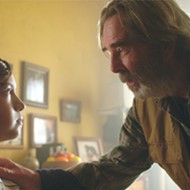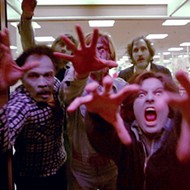[{
"name": "Ad - Medium Rectangle CC01 - 300x250",
"id": "AdMediumRectangleCC01300x250",
"class": "inlineCenter",
"insertPoint": "8",
"component": "2963441",
"requiredCountToDisplay": "12"
},{
"name": "Ad - Medium Rectangle LC01 - 300x250",
"id": "AdMediumRectangleCC01300x250",
"class": "inlineCenter",
"insertPoint": "18",
"component": "2963441",
"requiredCountToDisplay": "22"
},{
"name": "Ad - Medium Rectangle LC09 - 300x250",
"id": "AdMediumRectangleLC09300x250",
"class": "inlineCenter",
"insertPoint": "28",
"component": "3252660",
"requiredCountToDisplay": "32"
}]
I don't know if people are most offended by the film industry because of what it reflects about our cultural values or because of its potential to influence these values, but when I find myself ranting and raving about one movie or another, it's usually a little bit of both.
This week, Columbia Pictures is releasing Gridiron Gang, yet another movie about a group of men who find glory and redemption in the game of football. Two weeks ago, it was Invincible. Before that, it was Remember the Titans, The Replacements, Varsity Blues, Any Given Sunday, The Waterboy, Friday Night Lights, Brian's Song, The Longest Yard, North Dallas Forty, Paper Lion, and, perhaps the most famous of them all, Rudy. Despite their formulaic plots and excessive cheesiness, I love them all but one by one, they always let me down. I and any other tomboys who takes a chance on a new football movie hope that some film industry big shot will tire of the played-out scenes of men bashing into one another and create a movie that glorifies female football players.
Most football movies are driven by the overriding message that football gives men the opportunity to be part of something unforgettable, something that will forever distinguish them from ordinary mortals, redeem them for their pasts, and secure their futures and the fact that the girls never get to be a part of that is just plain mean.
No football movie is absolutely devoid of female characters, but none of them is ever truly important. Women are sexy cheerleaders, the prizes given to the good football players. In The Replacements, Shane Falco inelegantly states that "chicks dig scars" and, however macho and childish this statements sounds, the star quarterback wins cheerleading captain Annabelle with his football prowess. To be fair, Annabelle is never portrayed as a complete ditz the way her fellow stripper cheerleaders are. She knows football. She loves football. But Annabelle exists purely to support Falco, to give him the confidence that he needs to be a better football player. Her role and the role of every other cheerleader is to support the football player in his quest for victory, and because her role is merely supportive, she can never be a central figure.
The same is true for Varsity Blues, in which the top football player receives sexual favors from Darcy, the school's sexiest cheerleader. Maybe these movies are uplifting to men, but women are receiving the message that the only glory to which a female character has access is the reflected glory of dating the football hero. That's just not inspirational.
In the dozens of football movies Hollywood has produced in the past 40 or so years, there have been movies about a 5-foot-tall college student who played for Notre Dame and racist high school students in Virginia forced to play with black players. A chain-smoking soccer player has played football. A mama's boy with mental deficiencies has played football. A high-school nerd has the opportunity to play. Young gang-bangers in juvenile hall form a football team. Adults in prison play football against their guards. A sumo wrestler is given the opportunity to play football. A deaf man became a key player in The Replacements. Given the cast of misfits that Hollywood has cast as football players, it can't be all that far from the truth to believe that Hollywood will make a movie about a walking sausage playing football before a woman puts on a helmet and pads on screen.
And women's conspicuous absence from the football field is actively enforced through comments that mock the idea that a woman could play football. In Remember the Titans, enlightened, open-minded Coach Boone asks Coach Yoast why he doesn't give his daughter some pretty dolls to play with. If Sheryl, as a son, demonstrated the same interest in and knowledge of football, this interest would be encouraged, a source of pride. Instead, the young girl is taught very quickly that she doesn't have a place in the world of football. It's interesting that a movie that's supposed to teach people to suspend prejudice, to overcome racism, actively endorses sexism.
The Replacements affords an equally close-minded perspective, with Falco's coach, Jimmy McGinty, responding to Falco's statement that he received three concussions in one game by stating, "That's why girls don't play." McGinty's line is a cheap shot, an unnecessary reinforcement of the fact that women aren't welcome on the football field. The funny thing is, after watching movie after movie depicting men playing football, most women get the point if only subconsciously.
The attitude that women just don't care about football is wildly inaccurate. All around the country, women form and compete in football leagues that pay nothing. Young girls join high school teams at the risk of being socially ostracized. And some of us still sit in darkened theaters, eagerly but doubtfully hoping to be included in the camaraderie. Given that a woman's love for football comes at a greater expense than a man's, it's a wonder any of us still love it.
The true injustice of being so maliciously and determinedly excluded from the football field is that football never boils down to a simple game. It's always about glory, camaraderie, access to a better future, and redemption. In the previews for Gridiron Gang, a player tearfully announces that he wants to play football because he's tired of being a nobody. If excelling at football can wipe away past transgressions, then what happens to girls who want similar redemption? And every football movie has a halftime speech that implies that the football game is no less significant than the outcome of Milton's Paradise Lost. Take Tony D'Amato's half-time speech in Any Given Sunday. He tells the players that they're in hell, but they "can climb outta hell ... one inch at a time." Coach McGinty concludes The Replacements by claiming that the players' lives had been changed by the opportunity to play football "because they had been part of something great, and greatness, no matter how brief, stays with a man." During his half-time speech in Varsity Blues, Jonathon Moxon asks his teammates if they want to be heroes. In Friday Night Lights, the coach informs his team, "You may never matter again in your life as much as you do right now."
By being excluded from the football field, women are also being excluded from the greatness, the opportunity to be heroes, and the opportunity to truly matter. In football movies, there is no glory outside of football, no opportunity to be somebody without first proving your mettle on the football field. Even Darcy, the seemingly dumb cheerleader in Varsity Blues, knows that, staking her entire future on her ability to escape her small town through being the girlfriend of the football hero who will receive a scholarship and leave town presumably with her. There's no point in becoming enraptured by the game of football, the struggle on the field, the personalities of the players, though it's taken me years to realize that none of this is intended for me or any other woman. And until Hollywood wises up and puts a female on the field, I'm boycotting football movies. They're not meant for me anyway. ?
Arts Editor Ashley Schwellenbach reviews movies for New Times and played wide receiver in high school. Send comments to [email protected].








